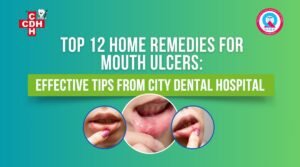Oral health has taken a backseat in our everyday lives. People have got so busy with their hectic schedules that they have started underestimating teeth hygiene. However, this is posing negative impacts on our overall oral health, causing issues like Periodontitis, bad breath, Gingivitis, and even oral cancers.
This is where Teeth Implant by City Dental Hospital, Rajkot, comes to their rescue. We’re the best dental clinic in Rajkot, Gujarat, with many senior hygienists and dentists working with us. We offer customized treatment plans to each patient after empathetically listening to all their problems. Additionally, we are NABH-certified (National Accreditation Board for Hospitals & Healthcare Providers).
One of the most critical questions people keep asking is, “Do you need to remove all teeth before getting implants?”.
Understanding Dental Implants
Dental implants have three components: the implant itself, an abutment, and a crown. The implant refers to the false root placed in the jawbone. The abutment connects it to the crown, making the crown visible. Ultimately, it is an alternative to your natural tooth.
There are several benefits of teeth implants, such as:
Improved Oral Heath
Implants not only provide replacement for teeth but also encourage oral health. They prevent problems like shifting of adjoining teeth, misalignment, and other tooth loss caused by conventional replacement methods.
Avoid Bone Loss
When a tooth is lost, the jawbone underneath it may deteriorate due to lack of stimulus. Dental implants have the necessary arousal to prevent teeth from falling and maintain facial structure.
Conservation of Natural Teeth
Unlike conventional dental ridges, implants are not dependent on adjacent teeth for assistance. In short, your natural teeth are unaffected during the procedure.
Must Read: How to Relieve Pain from Dental Implant
Types of Dental Implants
There are single, primary, and multiple types of dental implants, which are explained below:
Single Implants vs. Multiple Implants
Dental implants can provide a replacement for one tooth or many teeth. Here are your options.
- Single-tooth implant: If you have one tooth that needs substituting, your doctor will do a single-tooth implant. Then, they will put in a single replacement tooth or crown.
- Multiple-tooth implant: If you have lost a few teeth, your doctor may do a multiple-tooth implant with customized replacement teeth.
- Full-mouth implant: If you are toothless, your doctor may do a full-mouth dental implant.
Basic Dental Implants
The simplest forms of dental implants are subperiosteal and endosteal implants. The main point of distinction is how they’re attached to your jawbone.
- Endosteal implants: It’s formed into a small screw, cylinder, or blade. It goes into your jawbone and sticks to one or more replacement teeth, also called prosthetic teeth.
- Subperiosteal implants: This implant is put on or above your jawbone. It’s a metal structure that’s put under your gum and holds your gum to hold it in place.
The Myth: All Teeth Must Be Removed for Implants
There’s no need to extract healthy teeth because dental implants are placed individually and can be positioned between existing teeth.
If you want a complete set of implant-supported dentures, you may need to remove some or all of your leftover teeth for a proper fit.
If you only need one or two dental implants, single removal of damaged teeth is likely the best option. Patients with more severe conditions who only have a few natural teeth left may want to choose full removal instead. This allows you to use a hybrid set of full dentures attached by dental implants.

Factors Influencing the Need for Tooth Removal
There are several reasons why tooth removal may be needed. A prevalent cause involves a tooth that is too badly damaged from trauma or decay to be repaired. Other reasons include:
A crowded mouth
Sometimes dentists pull teeth to get the mouth ready for orthodontia. Orthodontia aims to correctly line up the teeth, which may be impossible if your teeth are too big for your mouth.
Infection
If tooth decay or destruction extends to the pulp — the core of the tooth containing nerves and blood vessels — bacteria in the mouth can enter the pulp. Ultimately, it leads to infection. Often, this can be treated with root canal therapy (RCT). However, suppose the disease is so severe that antibiotics or RCT do not cure it. In that case, extraction may be needed to prevent the infection spread.
Risk of infection
If your immune system is weak(for example, if you are receiving chemotherapy or have an organ transplant), even the risk of disease in a particular tooth may be reason enough to pull the tooth.
Periodontal (gum) disease
Suppose periodontal disease — the contamination of the tissues and bones that surround and support the teeth — has caused teeth loosening. In that case, pulling the tooth or teeth may be necessary.
Alternatives to Full Tooth Removal
Let’s quickly discuss alternative treatment methods aimed at preserving your natural smile.
Root Canal Therapy
Root canal therapy aims to save an infected or damaged tooth by removing infected pulp tissue and locking the root canal. This technique preserves the tooth’s structure and function while soothing pain and infection. Root canal therapy may be preferred in cases of deep contamination, pulp inflammation, or tooth fractures where removal is unnecessary.
Orthodontic Interventions
Orthodontic therapies such as braces and aligners can address misalignment issues by gradually shifting overcrowded teeth into proper alignment. By making space and improving dental alignment, orthodontic interventions can reduce the need for extractions in mild to moderate overlapping cases.
Periodontal Treatments
Gum disease, if left unchecked, can lead to tooth loss due to the destruction of the surrounding tissues and bone around the teeth. Non-surgical periodontal treatments, such as scaling and root planing, aim to remove plaque and tartar buildup to stop the progression of gum disease. Surgical mediations, such as flap or gum grafting, may be necessary for advanced cases to reinstate gum health and prevent tooth loss.
City Dental Hospital’s Approach to Dental Implants
We at City Dental Hospital provide the following facilities other than customized treatment plans:
WORLD-CLASS STERILIZATION
We have a world-class disinfecting system, i.e., MELAG-GERMANY. So, we guarantee safe treatments without any infection.
ADVANCED TECHNOLOGY
We provide all advanced technology with domestic OPG, CBCT, Lateral Ceph & intraoral scanners for perfection in treatment.
SPECIALIZED TEAM
We have a specialized team of senior doctors 24×7 at our hospital with a combined experience of 100+ years.
TRANSPARENT PRICING
We provide a very fair price for each & every treatment, which remains the same for every patient.
MINIMUM TIME
We assure you that we will accommodate patients in minimum time as we have the latest infrastructure of 15 dental chairs & all advanced technologies. The waiting period for any patient will be at most 15 minutes.

Case Studies
Let’s see what our patients say about our dental implant services:
- Rupaben Desai from Morbi
She was facing difficulties in chewing and talking. She has suggested a dental implant, which she feared very much. She was very nervous before the treatment but was assured by our professionals that everything would be fine. She was delighted with the treatment and recommended it to everyone.
- Rasikbhai Raithatha
He had undergone 15 teeth extractions in a row, followed by full-mouth implants on the same day. He found the treatment very satisfying and painless.
Conclusion
To summarise, dental implants by City Dental Hospital are painless and safe. Furthermore, we’re affordable, accept all forms of payment, and are loved by all our clients. You’re always welcome here if you’re facing any issues stated above or just want a routine dental checkup. Tap here to land on our contact page. Happy healing!















